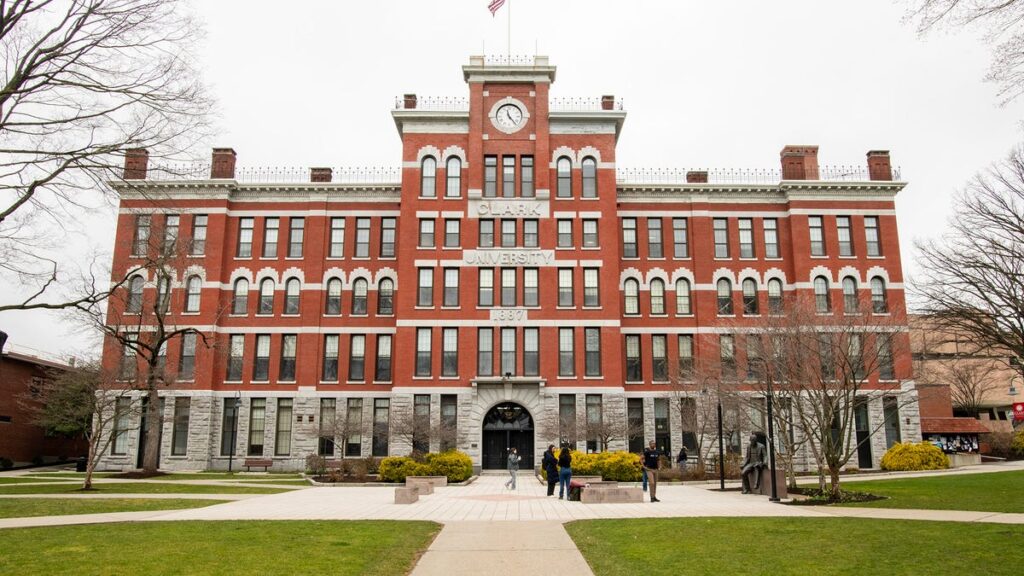(This story has been updated with additional information.)
WORCESTER ― Clark University is planning substantial cutbacks and restructuring as the school grapples with lower enrollment and the public’s changing attitude toward college, with a quarter of faculty expected to be laid off over the next two years.
“Now is a challenging time for those in higher education,” Clark President David Fithian said. “We are announcing this plan to refocus what you would call our educational offerings from a student perspective.”
In an interview with the Telegram & Gazette, Fithian and Vice President for Academic Affairs John Magee said the university will be restructured, with all programming encompassed in three different broad fields of study in The School of Climate, Environment and Society; The Center for Media Arts, Computing and Design; and in health and human behavior.
“We want to pick areas of academic studies where we know that we are good at,” Fithian said. “For smaller institutions, you can’t do everything equally well and we have to pick and choose what we are good at and what we are going to do going forward.”
While the university does not intend on cutting any programs, many of the programs will be placed to fit within the three main schools, streamlining a lot of the administrative process.
Clark officials stated that approximately 25% to 30% of faculty will have their positions eliminated over the next two years, although that number may change. The layoffs are expected to affect non-tenured, pre-tenured and adjunct faculty.
A decline in enrollment was cited as the biggest factor behind the changes. Fithian said the incoming freshman class, the Class of 2029, contains just 430 students, approximately 150 fewer than the school has averaged in the past. Fithian said the loss of students for the upcoming school year translates to approximately $7 million is less revenue.
Fithian added that the school has lost around $1.5 million this year in grant funding from the federal government, while adding that the total could change and it’s possible new grants could supplant lost revenue.
“There are some grants that are still getting approved for different programs — obviously some grants are being targeted more than others (for cancellation) but it’s possible we have more grant money in the future,” Fithian said.
Clark seeking to modernize approach
Fithian said several factors led to declining enrollment — the first that prospective students and their families have become more discerning about the college process.
“There is this doubt on whether going to college is the best path coming out of high school, and college has gotten expensive and more and more families are struggling to pay for it,” Fithian said. “We get questions now about demonstrating outcomes — and the number one question we get is asking what Clark students are paid one to three years after graduating. You hear a lot more questions about what our students do if they are, for example, a political science major.”
Another factor is what those in higher education refer to as the “demographic cliff,” an upcoming period where there will be a shortage of college-aged students, reflective of fewer births since the Great Recession in the late 2000s. Fithian said that the goal with the changes at Clark is to better position the school to thrive at what is anticipated to be a smaller scale.
“Colleges and universities have survived for as long as they have because they have not undertaken a lot of risks,” Fithian said. “What we are finding is that the environment that exists today will not allow for that. There is not this sense that if we just stay the course, others will revert to that. What we are doing is acknowledging that we need to change.”
At the graduate-school level, where a majority of the students are international, concerns about federal policy regarding student visas, including an incident in April in which 12 Clark students had their visas revoked, has led to apprehension about attending school in the United States.
“A lot of schools attract a lot of international students, and there is a lot of pause and apprehension coming from international students,” Fithian said. “Last year there was a delay in appointments for visas and we learned in August that a good number of students couldn’t get a visa appointment until October, November or December. I’m worried about that happening again — the visa appointments may get delayed or outright denied.”
Fithian added that he said the school may consider selling off real estate in the future.
Fithian said that moving forward, Clark and any other institute of higher learning needs to improve at showcasing the benefits of its education.
“What we need to do a better job across the board in higher ed is not just explaining outcomes that go beyond first-year salaries out of college, but to better connect what we think of is liberal arts education, broad-based learning to make sure students are exposed to a scientific perspective, a historical perspective,” Fithian said. “We need to do a better job demonstrating that the education we provide that connects those disciplines and the value that has to graduates.”

